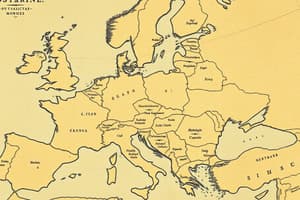Podcast
Questions and Answers
What event marked the beginning of Norman conquest in England?
What event marked the beginning of Norman conquest in England?
- Battle of Hastings (correct)
- The signing of the Magna Carta
- The establishment of the Doomsday Book
- The start of the Crusades
Which of the following is NOT a period of medieval criticism?
Which of the following is NOT a period of medieval criticism?
- Scholastic
- Carolingian
- Neoclassical (correct)
- High medieval
What was the primary purpose of the Crusades?
What was the primary purpose of the Crusades?
- To expand territory in Europe
- To rescue Jerusalem from Turks (correct)
- To promote trade with the East
- To spread the Renaissance
What does the term 'chivalric code' refer to?
What does the term 'chivalric code' refer to?
John Wycliffe is best known for which of the following acts?
John Wycliffe is best known for which of the following acts?
Which language was primarily used by the church and in centers of learning during the medieval period?
Which language was primarily used by the church and in centers of learning during the medieval period?
What major invention did William Caxton introduce to England?
What major invention did William Caxton introduce to England?
What was a significant impact of the Crusades on English society?
What was a significant impact of the Crusades on English society?
What does the term 'humanism' in the context of the Vitruvian Man primarily represent?
What does the term 'humanism' in the context of the Vitruvian Man primarily represent?
Which of the following terms best describes the critical approach focused on text accuracy and source integrity?
Which of the following terms best describes the critical approach focused on text accuracy and source integrity?
What is one of the main objectives of critics in Medieval literature?
What is one of the main objectives of critics in Medieval literature?
In Medieval Criticism, what does the term 'canonization' refer to?
In Medieval Criticism, what does the term 'canonization' refer to?
Which of the following methodologies contrasts with aesthetics in the context of criticism?
Which of the following methodologies contrasts with aesthetics in the context of criticism?
What role did critics play during the Medieval ages according to the content?
What role did critics play during the Medieval ages according to the content?
The concept of 'Literary Codes' in Medieval literature refers to what?
The concept of 'Literary Codes' in Medieval literature refers to what?
What aspect of criticism distinguishes 'Reader-Oriented Theories'?
What aspect of criticism distinguishes 'Reader-Oriented Theories'?
Flashcards are hidden until you start studying
Study Notes
Medieval and Renaissance Criticism
- The course explores Medieval and Renaissance criticism, focusing on its history, key figures, methodologies, and purposes.
Medieval Criticism
- Medieval theory viewed literature as a vehicle for personal and societal improvement, primarily in a religious context.
- Notable critics of the period include John Wycliffe and William Caxton.
- Medieval criticism is broadly divided into five periods:
- Late classical (1st century BC to 7th century AD)
- Carolingian (8th to 10th century AD)
- High medieval (11th to 12th century AD)
- Scholastic (13th to 14th century AD)
- Humanist (14th to 16th century AD)
Key Literary Genres in Medieval England
- Chivalric literature
- Moral literature
- Religious literature
- Secular literature
- Early beginnings of realistic literature
Medieval Literary Codes
- Chivalric Code/Moral Code: Emphasizing honor, courtly love, and knightly virtues.
- Religious Code: Reflecting the dominance of the Roman Catholic Church and its teachings.
- Secular Code: Emerges gradually, reflecting worldly concerns and growing humanistic thought.
Historical Context
- England was conquered by the Normans in 1066, leading to lasting social and cultural changes.
- The Battle of Hastings (1066) marked the defeat of King Harold by William the Conqueror.
- The Doomsday Book (1086) was a comprehensive record that documented social conditions.
- Normans were of Northmen origin, bringing French influences into England.
- The rise of nationalism in England was fueled by a combination of independence and patriotism.
Medieval Society
- Feudal system with a strict hierarchical structure, with vassals bound to overlords by oaths of loyalty in exchange for land and protection.
- Class positions were largely fixed, with the middle class developing later.
The Crusades
- A series of holy wars aimed at rescuing Jerusalem from the Turks.
- Brought England into contact with Arabic culture, influencing mathematics and medicine.
- The Crusades also encouraged the development of chivalry.
Medieval Religion
- Christendom: Dominance of the Roman Catholic Church in England.
- Latin was the language of learning and scholarship.
- Gothic Cathedrals were a testament to architectural innovation and religious devotion.
- The Church played a significant role in owning and controlling land and resources.
Key Figures
- John Wycliffe: A theologian who translated the Bible into English in the 1380s. He was denounced as a heretic for challenging the Church's authority.
- William Caxton: Introduced the printing press to England in 1476, playing a pivotal role in disseminating knowledge and literature.
The Vitruvian Man
- A drawing by Leonardo da Vinci representing the Renaissance ideal of humanism.
- The figure is placed within a circle and square symbolizing the relationship between the divine and the earthly.
Humanism
- A philosophical and cultural movement that emphasized human potential and reason.
- It challenged the dominance of religious dogma and encouraged the study of classical literature and thought.
Secularization of Knowledge
- The process of separating knowledge from religious authority.
- This shift led to a greater emphasis on reason and observation in understanding the world.
Canonization and Reconciliation
- The process of establishing a recognized body of authoritative texts and knowledge.
- Medieval scholars sought to reconcile classical philosophical works with Christian beliefs.
Hermeneutics
- The theory and practice of interpretation, particularly of texts.
- Medieval scholars developed methods of interpretation to understand the writings of the Bible and other religious texts.
Medieval Literary Consciousness
- Literary codes and genres reflected the social, religious, and cultural contexts of the time.
- Chivalric, moral, religious, and secular genres all played a role in shaping medieval literature.
- The rise of realistic literature began to emerge, introducing elements of worldliness and everyday life into written works.
Studying That Suits You
Use AI to generate personalized quizzes and flashcards to suit your learning preferences.



